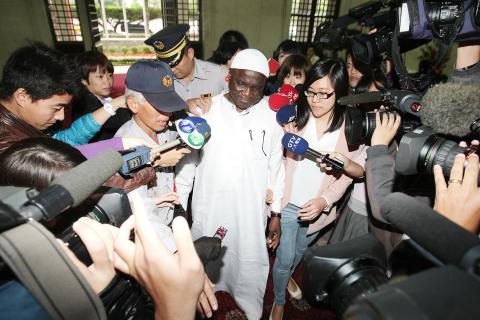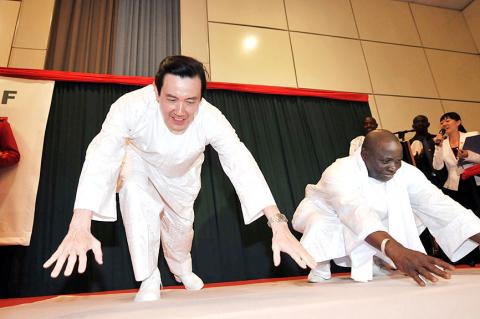President Ma Ying-jeou’s (馬英九) administration was caught by surprise yesterday when Gambian President Yahya Jammeh abruptly announced that the nation was severing ties with the Republic of China (ROC). However, the government was quick to state that China was not behind the move, as it faced a barrage of questions about its much-touted “flexible diplomacy.”
A statement from Jammeh’s office on Thursday said his government was cutting diplomatic ties with Taiwan with immediate effect, according to a Reuters report published at 5:42am Taipei time yesterday (9:42pm on Thursday in the Gambia).
The Gambia is the first country to break off relations with Taiwan since Ma assumed the presidency in May 2008, elected on his campaign of “flexible diplomacy,” which he described as a policy to ensure that Taiwan does not lose any more diplomatic allies because its signifies a “truce” with the People’s Republic of China (PRC) on the international arena.

Photo: CNA
“This was an isolated case. As things stand now, there seems to be no relation between the incident and mainland China,” Premier Jiang Yi-huah (江宜樺) said at a question-and-answer session at the legislature.
The government will strive to restore diplomatic ties with the Gambia, although “the chance is very slim” because Jammeh had announced the decision at a Cabinet meeting, Jiang said.
Bombarded with questions from lawmakers about the administration’s “flexible diplomacy,” Jiang said: “The problem is not with the policy of ‘flexible diplomacy’ itself... but we do need to find out what went wrong.”

Photo: CNA
Jiang said he had demanded that the Ministry of Foreign Affairs conduct a thorough review on why it did not know of the Gambia’s plan and give the public a clear account of what led to the incident.
The ministry should be held responsible, he added.
According to the Reuters report, Jammeh said in the statement that the “decision has been taken in our strategic national interest.”
“We are proud that we have been a very strong and reliable partner of the ROC (China) for the past 18 years, the results of which are there for every Taiwanese to see,” the statement said.
Despite the announcement, Jammeh said in the statement that the Gambia hoped to “remain friends” with the Taiwanese people.
That left the ministry struggling to explain why Jammeh decided to sever what he repeatedly called “solid, strong and cordial relations” over the past 18 years since the two countries resumed ties in 1995.
At a press conference at the ministry, Department of West Asian and African Affairs Director-General David Wang (王建業) said the status of relations between Taiwan and the Gambia at present was “suspended.”
The term was different to what Jammeh said in the note, with a letter to Ma attached, given to the ROC embassy in the Gambia, that his country “terminated” diplomatic ties with Taiwan, Wang said.
Right after Ambassador to the Gambia Samuel Chen (陳士良) received the note at 4pm on Thursday, state Radio Gambia made the announcement, and then Reuters picked up the news, Wang said.
Chen was not able to meet with Jammeh at the time to verify the note because Jammeh was at a meeting, but Chen had talked to a very high-ranking Gambian official before he sent the information back to Taipei, Wang said.
In Taipei, Gambian Ambassador to Taiwan Alhagie Ebrima Jarjou arrived at the ministry at 9:30am after being summoned by Minister of Foreign Affairs David Lin (林永樂).
Jarjou told reporters he had not been informed of his government’s decision.
Asked what prompted Jammeh’s decision and what role China played, Wang cited Jammeh’s letter to Ma. In the letter, Jammeh said his country was happy to see a significant reduction in cross-strait tensions and that Taiwan-China relations are now at its best since 1994, when he became president of the Gambia, Wang aid.
In light of the major progress in cross-strait ties, the Gambia decided to take a “neutral” position toward the interactions between Taiwan and China, Wang quoted Jammeh’s letter to Ma as saying.
Wang said the ministry has not seen any sign of Chinese involvement in Jammeh’s decision.
“Unlike before, the Gambia did not sign a communique that it was establishing diplomatic relations with Beijing,” Wang said, adding that the ministry was “keeping vigilant” to see how the situation evolves.
The national flag of the Gambia was briefly taken down from the lobby of the ministry’s building, where an array of national flags of the country’s all diplomatic allies were displayed, but later put back up.
During the 40-minute meeting with Jarjou, Lin asked him to seek further details about Jammeh’s move and convey the “solemn position” of the ROC government to Jammeh, ministry spokeswoman Anna Kao (高安) said.
Chen was instructed by the ministry to meet with Jammeh.
However, sources said that it was unlikely that Chen will see Jammeh anytime soon because the Gambian president is leaving for a summit with the heads of state in Asia and Africa next week.
Kao said the ministry would make an appropriate response to Jammeh’s decision “in line with the principle of maintaining our nation’s dignity” after the ministry conducts a thorough review of bilateral relations.
In the statement to the Gambia, the ministry said the ROC government expressed “shock” and “regret” about the immediate termination of bilateral ties.
Ma did not make any comment on the matter yesterday. The Presidential Office also maintained a low profile over the incident. The president met with Jiang briefly in the morning to discuss the matter and then attended a scheduled event in the Presidential Office later.
On Wednesday, during a meeting with an accountants’ association at the Presidential Office, Ma even lauded the Gambia for making donations to Taiwan in the wake of Typhoon Morakot, apparently unaware of Jammeh’s plan to end diplomatic ties.
Amid concerns about the possibility of the Gambia establishing ties with China, the Mainland Affairs Council said it was important for the two sides of the Taiwan Strait to maintain mutual trust and positive interactions to promote cross-strait development.
“The two sides should cherish the fruitful results of cross-strait interactions and not damage the mutual trust that took years to build, so that cross-strait relations will continue to make progress,” the council said.
Additional reporting by Mo Yan-chih

CALL FOR SUPPORT: President William Lai called on lawmakers across party lines to ensure the livelihood of Taiwanese and that national security is protected President William Lai (賴清德) yesterday called for bipartisan support for Taiwan’s investment in self-defense capabilities at the christening and launch of two coast guard vessels at CSBC Corp, Taiwan’s (台灣國際造船) shipyard in Kaohsiung. The Taipei (台北) is the fourth and final ship of the Chiayi-class offshore patrol vessels, and the Siraya (西拉雅) is the Coast Guard Administration’s (CGA) first-ever ocean patrol vessel, the government said. The Taipei is the fourth and final ship of the Chiayi-class offshore patrol vessels with a displacement of about 4,000 tonnes, Lai said. This ship class was ordered as a result of former president Tsai Ing-wen’s (蔡英文) 2018

UKRAINE, NVIDIA: The US leader said the subject of Russia’s war had come up ‘very strongly,’ while Jenson Huang was hoping that the conversation was good Chinese President Xi Jinping (習近平) and US President Donald Trump had differing takes following their meeting in Busan, South Korea, yesterday. Xi said that the two sides should complete follow-up work as soon as possible to deliver tangible results that would provide “peace of mind” to China, the US and the rest of the world, while Trump hailed the “great success” of the talks. The two discussed trade, including a deal to reduce tariffs slapped on China for its role in the fentanyl trade, as well as cooperation in ending the war in Ukraine, among other issues, but they did not mention

HOTEL HIRING: An official said that hoteliers could begin hiring migrant workers next year, but must adhere to a rule requiring a NT$2,000 salary hike for Taiwanese The government is to allow the hospitality industry to recruit mid-level migrant workers for housekeeping and three other lines of work after the Executive Yuan yesterday approved a proposal by the Ministry of Labor. A shortage of workers at hotels and accommodation facilities was discussed at a meeting of the legislature’s Transportation Committee. A 2023 survey conducted by the Tourism Administration found that Taiwan’s lodging industry was short of about 6,600 housekeeping and cleaning workers, the agency said in a report to the committee. The shortage of workers in the industry is being studied, the report said. Hotel and Lodging Division Deputy Director Cheng

TOKYO SUMMIT: The new Japanese PM’s words have demonstrated Japan’s ‘firm position on urging the prioritization of cross-strait peace,’ the foreign ministry said Minister of Foreign Affairs Lin Chia-lung (林佳龍) yesterday thanked US President Donald Trump and Japanese Prime Minister Sanae Takaichi for supporting peace in the Taiwan Strait, a day after the two at a summit in Tokyo emphasized the importance of regional stability and ahead of a meeting between Trump and Chinese President Xi Jinping (習近平) in South Korea today. The previous day’s meeting was the first time Takaichi had met with the US leader since becoming Japanese prime minister, the Ministry of Foreign Affairs said in a statement. Since taking office on Tuesday last week, Takaichi has urged the international community to